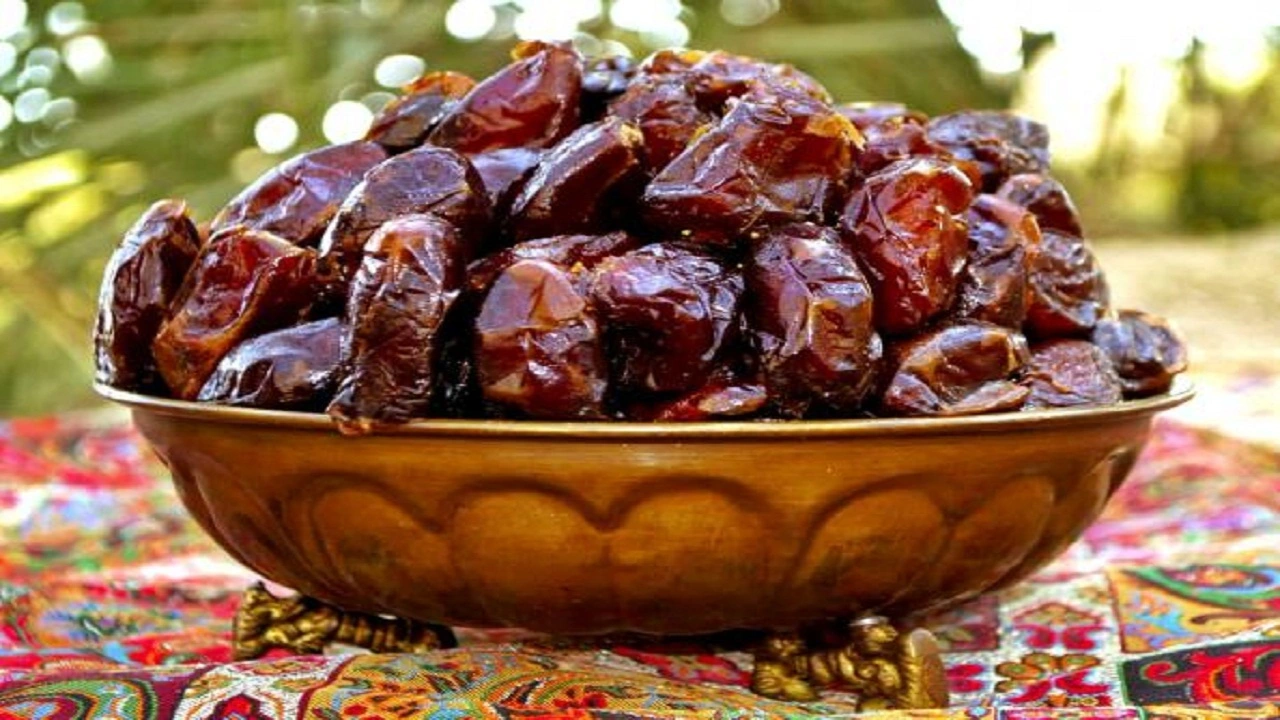Refined sugar has become a daily habit for millions, but it comes with hidden health costs — from fatigue to inflammation. Around the world, people are rediscovering natural sweeteners that provide both flavor and nutrition. Among them, dates stand out: a traditional Middle Eastern fruit that offers rich caramel-like sweetness, essential nutrients, and long-lasting energy. In this article, we explore how dates can replace sugar naturally, benefiting your body, mind, and lifestyle.
“Looking for high-quality Sayer (Estameran) dates? Contact us today to learn how to bring this natural sweetener to your store or kitchen.”
Why We Crave Sugar — And Why Natural Sweeteners Are on the Rise
Several factors are contributing to the growing preference for natural sweetness over refined sugar, including heightened health awareness, a global shift towards natural foods, and a better understanding of both the risks of refined sugar and the benefits of alternatives.

Health awareness and education
- Widespread knowledge of sugar’s risks: Media coverage and nutrition experts have widely documented the negative health consequences of excessive refined sugar consumption, including weight gain, obesity, type 2 diabetes, heart disease, inflammation, and insulin resistance.
- Desire for nutrient-dense options: Consumers are more educated about nutrition and actively seek food that offers more than just calories. Natural sweeteners like dates contain fiber, vitamins, minerals, and antioxidants that are absent in refined sugar, providing a more balanced energy source.
- Reduced blood sugar spikes: Unlike processed sugar, the fiber in whole-food sweeteners like dates slows the absorption of sugar, preventing the rapid blood sugar spikes and crashes that cause fatigue and trigger more cravings. Source
Psychological and evolutionary factors
- Innate preference for sweetness: The human preference for sweet tastes is innate and evolved as a survival mechanism. In prehistoric times, sweetness signaled an energy-rich food source, like ripe fruit, that was safe to eat. While modern humans live in an environment of sugar abundance, this evolutionary programming remains.
- The emotional comfort of sweets: Sweet foods can trigger the release of “feel-good” chemicals like dopamine and serotonin in the brain, creating a sense of happiness and pleasure. This provides a powerful psychological driver for craving sweets, especially during times of stress or sadness.
- Flavor and taste preferences: The desire for sweetness can also be a matter of learned preference. Regular consumption of heavily sweetened, processed foods can make an individual accustomed to a very high level of sweetness, making less-sweet natural foods seem bland by comparison. Source
- Global trend toward natural foods: The healthy foods market is experiencing significant growth, driven by a consumer-led movement away from artificial and ultra-processed ingredients. Consumers increasingly favor foods that are minimally processed and transparently labeled.
- Social media influence: Food bloggers and social media influencers play a significant role in popularizing natural sweetener alternatives. In a study analyzing social media, conversations about sugar had consistently lower positive attitudes than discussions about alternatives like monk fruit and coconut sugar.
- Clever marketing strategies: Food marketers use terms like “healthy,” “natural,” and “naturally sweetened” to position natural alternatives as premium products. This strategy appeals to consumers’ desire for healthier options and helps justify higher price points for goods containing natural sweeteners. Source
The Science Behind Dates’ Natural Sweetness
Dates’ natural sweetness comes from a high concentration of carbohydrates, primarily in the form of the simple sugars fructose and glucose, and in some varieties, sucrose. As dates ripen and dry, their moisture content decreases, which further concentrates their sugars and intensifies their sweet, caramel-like flavor. Source

Sugar composition
The sugar makeup in dates can vary depending on the specific cultivar and its stage of ripeness. Source
- Fructose and glucose: These are monosaccharides, or simple sugars, which are abundant in dates. In many varieties, fructose is the dominant sugar, with nearly equal amounts of glucose.
- Sucrose: A disaccharide (a sugar made of one fructose and one glucose molecule), sucrose is present in varying amounts depending on the variety. Some cultivars, like the Deglet Noor, contain significant levels of sucrose, while others contain very little. During the ripening process, the enzyme invertase breaks down sucrose into its component sugars, fructose and glucose. Source

Ripening and drying process
The maturation process plays a significant role in a date’s sweetness. Source
- Early stage (Kimri): In the earliest, unripened stage, dates are green and have a high moisture content and a low sugar content.
- Ripening stage (Rutab): As the fruit ripens, it changes color, softens, and begins to lose moisture. The sugar content rises, and the tannins that give unripe dates their astringent taste dissipate.
- Mature stage (Tamr): This is the final and most familiar stage for many dates. The fruit has reached peak sweetness, with sugar composing as much as 70–80% of the date by dry weight. At this point, the date has a low moisture content, a sticky texture, and an intensely sweet flavor. Source

The difference between date sugar and refined sugar
Dates offer sweetness in a different package than refined white sugar, which is pure sucrose. Source
- Whole food vs. processed: Dates are a whole food, which means you consume all their nutrients along with the sugar. Refined sugar is a highly processed product stripped of all nutritional content.
- Fiber content: Dates contain dietary fiber, which slows the absorption of their sugars, preventing the dramatic blood sugar spikes caused by refined sugar.
- Nutrient density: Unlike refined sugar, dates are a good source of vitamins, minerals like potassium and magnesium, and antioxidants, providing more nutritional value along with sweetness. Source
The Nutritional Edge: More Than Just Sweetness
The nutritional benefits of dates go far beyond their sweetness, making them a healthier sugar alternative. Unlike refined sugar, dates are a whole food that is packed with fiber, essential minerals, vitamins, and protective antioxidants. Source

Nutritional profile
A 100-gram serving of dates provides a wide range of beneficial nutrients, including: Source
- Carbohydrates: Approximately 75–80 grams, primarily in the form of natural sugars like glucose and fructose.
- Fiber: Around 6–8 grams, offering both soluble and insoluble fiber that is crucial for digestion.
- Protein: About 2–2.5 grams, containing 23 different types of amino acids.
- Minerals: A significant source of potassium, magnesium, copper, and iron, which are vital for heart health, blood pressure regulation, and energy production.
- Vitamins: A source of several vitamins, including B vitamins (B1, B2, B3, B6), vitamin C, and vitamin K.
- Antioxidants: Abundant in flavonoids, carotenoids, and phenolic acids, which combat harmful free radicals and reduce inflammation. Source
“Dates are rich in natural sugars, fiber, and antioxidants, making them a healthier alternative to refined sugar.”
Advantages over refined sugar
While both dates and refined sugar contain carbohydrates and calories, they affect the body very differently.
- Digestive health: The high fiber content in dates promotes regular bowel movements and feeds beneficial gut bacteria, which supports overall digestive health. Refined sugar offers no such benefits and can negatively affect the gut.
- Sustained energy: The fiber in dates slows down the absorption of their natural sugars, which provides a steady release of energy. This prevents the rapid blood sugar spikes and subsequent crashes associated with eating refined sugar.
- Lower glycemic impact: Dates have a low to moderate glycemic index (GI) compared to refined sugar’s high GI. When eaten in moderation, they have a gentler effect on blood sugar levels.
- Heart health: The potassium and fiber in dates can help manage blood pressure and lower LDL (“bad”) cholesterol, supporting a healthy heart. Refined sugar offers no cardiovascular benefits.
- Bone health: Dates contain important minerals like calcium, potassium, magnesium, and phosphorus that are essential for maintaining strong bones and preventing conditions like osteoporosis.
- Brain health: Some studies suggest that the antioxidants in dates may help reduce inflammation in the brain and lower the risk of neurodegenerative diseases, such as Alzheimer’s.
- Anticancer properties: Research has identified compounds in dates, including the fiber beta-D-glucan, that demonstrate anti-tumor properties and may help reduce the risk of certain cancers.
How to use dates for maximum benefit
While dates are a healthier option, they are still calorie-dense and should be enjoyed in moderation. To further minimize their impact on blood sugar, pair them with nuts, seeds, or yogurt to add healthy fats and protein.
To replace refined sugar, use date paste as a 1:1 substitute in baked goods or add chopped dates to smoothies and granola for natural sweetness. Source

Here’s a simplified look at what’s inside a typical 100g serving of dried dates:
| Nutrient | Amount |
| Calories | Around 280 |
| Carbohydrates | ~75g |
| – Natural Sugars | ~66g |
| – Fiber | ~7g |
| Protein | ~2g |
| Fat | <0.5g |
| Potassium | ~650-690mg |
| Magnesium | ~50-60mg |
| Iron | ~0.9-1mg |
| Vitamin B6 | ~0.25mg |
Dates vs. Refined Sugar: Which Is Healthier?
Refined sugar is composed of empty calories that provide quick energy without nutritional value, while dates offer natural sweetness alongside fiber, minerals, and antioxidants. The key differences in their health effects involve blood sugar regulation, heart health, nutrient density, and impact on weight management. Source
Nutritional comparison
| Feature | Dates | Refined Sugar |
| Nutrient density | Contains vitamins (like B6 and K) and minerals (potassium, magnesium, iron, copper). | Offers no vitamins or minerals. It is considered an “empty calorie” food. |
| Fiber | A 3.5-ounce (100-gram) serving provides almost 7 grams of dietary fiber, including both soluble and insoluble types. | Contains no fiber. |
| Antioxidants | Rich in protective antioxidants like flavonoids, carotenoids, and phenolic acid, which have anti-inflammatory and disease-fighting properties. | Contains no antioxidants. |
| Processing | A whole, minimally processed food. Even products like date sugar are simply ground-up dried dates, retaining nutrients. | Extensively processed from sugarcane or beets, removing all beneficial components to create pure sucrose. |
Health effects
| Feature | Dates | Refined Sugar |
| Blood sugar impact | The fiber in dates slows down sugar absorption, leading to a slower and more gradual rise in blood sugar. Their average glycemic index (GI) is in the low-to-moderate range (around 42 for date sugar), compared to table sugar’s high GI of 100. | Lacking fiber, it is quickly digested and causes rapid, high blood sugar spikes, followed by a crash. |
| Energy release | Provides more sustained energy due to the slower absorption of its natural sugars. | Causes a fast, but short-lived, energy boost, often followed by fatigue and increased cravings. |
| Heart health | The fiber and potassium can help lower LDL (“bad”) cholesterol and support healthy blood pressure. Antioxidants also protect the heart from inflammation. | Excess intake can increase the risk of heart disease through weight gain, high blood pressure, and chronic inflammation. |
| Digestive health | High fiber content aids healthy digestion, adds bulk to stool, and promotes regular bowel movements. | Has no benefits for digestive health. |
| Weight management | While calorie-dense, the fiber promotes a feeling of fullness and helps manage appetite. | Liquid calories from sugar-sweetened drinks do not promote satiety, which can lead to excessive calorie intake and weight gain. |
| Brain health | Animal studies suggest dates’ antioxidants may reduce inflammatory markers in the brain, potentially lowering the risk of neurodegenerative diseases. | High intake of refined sugar has been linked to higher levels of inflammation and an increased risk of cognitive issues. |
When used in moderation, dates are a clear nutritional winner compared to refined sugar. They provide a dose of fiber, minerals, and antioxidants along with their natural sweetness, offering a more balanced energy source without the dramatic blood sugar fluctuations. While dates are not calorie-free and should be consumed mindfully, they offer tangible health benefits that are completely absent in refined sugar. Source
Real-Life Benefits: How Dates Improve Energy and Well-Being
Dates are a highly effective, natural energy source with tangible benefits for various lifestyles, including athletes, students, and busy professionals. Their unique nutritional makeup delivers sustained energy, enhances well-being, and provides essential nutrients that support both physical and mental performance. Source
Benefits for athletes: Pre- and post-workout fuel
Dates serve as a superior alternative to processed energy gels and sports drinks for athletes, offering a natural source of carbohydrates and key minerals. Source
- Quick and balanced energy: Dates are packed with natural sugars (fructose, glucose, and sucrose) that are easily digestible and provide a rapid, yet steady, energy release without the sharp spike and crash of refined sugar.
- Electrolyte replenishment: The high potassium content in dates is crucial for maintaining electrolyte balance and preventing muscle cramps during and after exercise.
- Muscle recovery: The carbohydrates in dates help replenish depleted glycogen stores in muscles post-workout. Combining them with a protein source, like nuts or nut butter, maximizes muscle recovery and rebuilding.
- Anti-inflammatory effects: Antioxidants like flavonoids and phenolic acids in dates help combat the oxidative stress and inflammation that occur with intense exercise, which can speed up recovery time and reduce muscle soreness.
Benefits for students: Fueling focus and memory
Dates provide a mental boost that helps students maintain concentration and cognitive function during long study sessions.
- Brain function: The natural sugars, B vitamins, and antioxidants in dates provide a steady fuel source for the brain. This can help enhance memory, improve learning ability, and support overall cognitive function.
- Steady energy without the crash: Unlike sugary treats that lead to a blood sugar crash and mental fatigue, the fiber in dates ensures a slow, sustained release of energy. This helps students stay focused for longer without the dreaded mid-afternoon slump.
- Nutrient-dense alternative: As a study snack, dates offer more than just energy. They provide vitamins, minerals, and antioxidants that support overall brain health, giving students a healthier option than processed junk food.
- Stress reduction: Dates contain compounds that help regulate mood and support emotional resilience. This can be especially helpful for students experiencing stress or anxiety during exam season.
Benefits for busy professionals: Beating the mid-day slump
For professionals who need to maintain energy and focus throughout a hectic workday, dates are a convenient and healthy snack.
- Quick energy on-the-go: Dates are a portable, non-perishable, and mess-free snack. Keeping a few dates in a desk drawer or bag provides a quick, healthy energy boost to power through meetings or tasks.
- Avoiding the afternoon crash: Instead of reaching for a sugary coffee or candy bar that provides a fleeting high, dates offer a more stable and longer-lasting energy source to overcome the typical mid-day slump.
- Mood and well-being: Dates contain amino acids like tryptophan and B vitamins that can help with mood regulation and well-being. This can be a natural way to combat fatigue and mental fogginess.
- Digestive health: The fiber in dates also aids digestion, promoting a healthy gut microbiome. A balanced gut is linked to better energy levels and overall health, helping busy professionals feel their best.
How to incorporate dates into your daily routine
- Pre-workout: Eat 2–3 dates 30 to 45 minutes before exercising for a quick energy boost.
- Post-workout: Combine dates with a source of protein, like nuts or Greek yogurt, to help replenish glycogen stores and aid muscle recovery.
- Study snack: Stuff a few dates with nuts or nut butter for a balanced snack that provides sustained energy and supports concentration.
- Busy workdays: Use date paste to sweeten coffee or add chopped dates to your morning oatmeal for a nutritious start to the day. For an afternoon snack, pair a handful of dates with a source of healthy fat, like nuts or seeds, to stay energized. Source
How to Replace Sugar with Dates in Everyday Recipes
Substituting dates for refined sugar is an excellent way to add natural sweetness and beneficial nutrients to your daily diet. While the best method depends on the recipe, dates can be used in the form of whole dates, date paste, date syrup, or date powder. Source
How to use dates in everyday life
In smoothies
Dates provide sweetness, nutrients, and fiber, and their sticky texture helps create a creamy consistency. Source

- Whole dates: Add 1–3 pitted Medjool dates directly into your blender with your other smoothie ingredients. Their natural stickiness helps to bind and thicken the drink.
- Date paste: For a perfectly smooth texture and consistent sweetness, add a spoonful of homemade date paste. Start with 1 tablespoon and add more to taste.
For baking
Dates can replace sugar in many baked goods, especially moist ones like cookies, brownies, and cakes. Source

- Date paste: Substitute granulated sugar for date paste at a 1:1 ratio. Keep in mind that date paste is denser and adds moisture, so you may need to reduce other liquid ingredients by about 25%.
- Whole or chopped dates: Add chopped dates to baked goods, especially muffins and breads, for extra moisture, texture, and bursts of caramel-like sweetness.
- Date sugar: For recipes where the texture of granulated sugar is important, use date sugar, which is made from dried, ground dates. Date sugar does not dissolve like refined sugar, so it is best used in recipes that can accommodate a slightly grainy texture.
In energy bars and balls
Dates are an ideal binder and sweetener for no-bake snacks, offering sustained energy from natural sugars and fiber.
- Whole dates: Combine pitted dates with nuts, seeds, oats, and other dried fruits in a food processor. The natural stickiness of the dates will bind the ingredients together.
- No-bake recipe: For quick and easy no-bake energy bars, blend 1.5 cups of pitted dates with 1 cup of nuts and 2 tablespoons of cocoa powder in a food processor until it forms a dough. Press into a pan, chill, and cut into bars.
For sweetening coffee or tea
Date paste and syrup are excellent liquid sweeteners that blend seamlessly into hot or cold beverages. Source
- Date paste: To make a quick date syrup, blend soaked dates with a small amount of hot water until smooth. Stir 1–2 teaspoons of this mixture into your hot coffee or tea for a caramel-like flavor.
- Date syrup: For a smoother consistency, use date syrup. Many brands sell date syrup, or you can make your own at home by boiling dates in water and straining the solids. This can be a perfect sugar replacement in lattes, iced coffees, and other mixed drinks.
How to make your own date paste
Making date paste at home is simple and ensures you have a versatile, unrefined sweetener on hand. Source
Ingredients:
- 1 cup of pitted dates (Medjool dates are recommended for their soft texture)
- ¾ cup of hot water
Instructions:
- Soak: Put the pitted dates in a bowl and pour the hot water over them. Let them soak for 10–15 minutes to soften.
- Blend: Transfer the dates and the soaking water to a high-speed blender or food processor.
- Process: Blend until you have a thick, smooth, and uniform paste. Scrape down the sides as needed. For a thinner consistency, add a little more water.
- Store: Store the paste in an airtight container in the refrigerator for up to 3 months.
Middle Eastern Wisdom: Dates as a Source of Natural Energy
In the heart of the Middle East, where the golden desert sun meets the sky, the story of dates is deeply woven into the daily lives, culture, and traditions of the people. More than just a sweet fruit, dates represent hospitality, nourishment, and a connection to the natural world. Source
A symbol of life and resilience
For centuries, the date palm has been known as the “tree of life”. In harsh desert climates where little else could grow, this resilient tree provided essential sustenance. A few dates could sustain desert travelers and Bedouin families for days, providing the concentrated energy needed to survive and thrive. Source
Even today, this historical appreciation for the date’s life-giving properties endures, making it a source of natural energy valued by everyone from athletes to busy professionals. The date’s ability to provide a sustained energy boost, rich with vitamins and minerals, is a secret known for centuries to those living in the desert.
Hospitality and shared moments
In Middle Eastern culture, hospitality is a core value, and dates are often the first thing offered to guests. A typical welcome involves a bowl of dates served alongside a tiny cup of aromatic Arabic coffee, a tradition that signifies warmth, generosity, and respect. This simple act connects people, turning a casual visit into a shared moment of community and blessing.
In some Gulf countries, upscale date boutiques have emerged, offering luxury, gourmet dates as gifts for holidays, business meetings, and special events.
Religious and spiritual significance
Dates hold profound spiritual meaning in both Islamic and Christian traditions.
- During Ramadan: For Muslims, dates are an essential part of the holy month of Ramadan. The Prophet Muhammad broke his fast with dates, establishing a tradition that continues to this day. A single date after a day of fasting provides a quick, yet gentle, release of natural sugars, helping to restore energy and balance to the body.
- A divine gift: The Qur’an mentions dates and the date palm more than 20 times, emphasizing their significance as a blessed food. The story of Mary in the Qur’an eating dates to gain strength during childbirth highlights their nourishing properties.
Cherished childhood memories
Many people in the Middle East have fond memories of dates, such as gathering with family in the orchards to harvest them or enjoying date-filled treats baked by their grandmothers. A Saudi colleague once laughed, “I would sleep with dates in my pockets as that’s the first thing I wanted to consume after waking up!”.
This ingrained appreciation for dates’ natural energy and role in family life extends into adulthood. For students studying late, professionals facing a mid-day slump, or athletes training, dates remain the go-to secret for a healthy and satisfying energy boost. Source
Conclusion: A Simple Step Toward a Healthier Lifestyle
Tired of the sugar rush followed by an inevitable crash? It’s time to swap out refined sugar for a natural, whole-food alternative. Dates offer a delicious, fiber-rich, and nutrient-dense way to satisfy your sweet tooth while improving your overall health and well-being. Source
Here are a few simple steps to make dates your new “sweet habit” and embrace a healthier lifestyle:
Start small, snack smart
When a sugar craving hits, reach for a couple of dates instead of a cookie or candy bar. This simple switch gives you: Source
- Sustained energy: The fiber in dates slows the absorption of their natural sugars, providing a steady release of energy that prevents blood sugar spikes and crashes.
- Nutrient boost: Unlike empty-calorie sweets, dates provide potassium, magnesium, and other essential minerals, supporting everything from heart health to bone strength.
- Satisfying sweetness: The rich, caramel-like flavor of dates can satisfy your craving in a truly delicious way. For an extra treat, stuff them with nut butter and sprinkle with cinnamon or sea salt.
Swap out sweeteners in your favorite recipes
Making date paste is a simple way to replace refined sugar in many of your go-to recipes, from baking to smoothies. Source
- How to make date paste: Soak pitted dates in hot water for 10–15 minutes, then blend with the soaking water until you have a smooth, thick paste.
- For baking: In baked goods like cookies, muffins, and brownies, use date paste in a 1:1 ratio to replace granulated sugar. Just be aware that it adds moisture, so you may need to reduce other liquids in the recipe.
- For beverages: Blend date paste into your smoothies or use it to sweeten your coffee or tea for a richer, more nuanced flavor.
Make easy, delicious energy bars
Dates are the perfect base for no-bake energy bars and balls, making for a quick and wholesome snack.
- Simple recipe: Pulse pitted dates, nuts, seeds, and oats in a food processor until the mixture forms a dough. Press the dough into a pan and chill. Cut into bars and enjoy.
- Post-workout fuel: Combining dates with a source of protein and healthy fats, such as nuts, helps replenish glycogen stores and aid in muscle recovery after exercise.
By making these small, consistent changes, you can retrain your palate to crave less-processed foods and enjoy the natural sweetness and nutritional benefits of dates. Embrace this new sweet habit, and your body will thank you. Source






Leave a Reply